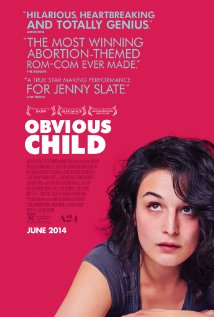The Media Research Center’s Katie Yoder wrote two articles bashing the film “Obvious Child” for its abortion-related subject matter despite, as we noted, never having seen the film.
Yoder defends her deliberate ignorance in a June 18 MRC article and attacks the critics who called her out for bashing a film she hadn’t seen as raising a “bogus” argument:
When “Obvious Child” hit theaters this month, conservatives were aghast the media glorified it – without irony – as an “abortion romantic comedy.” Liberals lashed back, claiming, like the movie’s Director Gillian Robespierre, that “[Conservatives bashing Obvious Child] haven’t seen the movie; they’re basing it on articles and trailers.”
That defense is bogus. We are, after all, talking about the destruction of innocent human life – something nearly impossible to contextualize and utterly repulsive as a romantic comedy plot device.
Yoder’s defensiveness is itself bogus. Simple journalistic honesty dictates that you first fully encounter something before you attack it. Apparently, the MRC doesn’t teach its writers to do that.
Yoder’s column is actually her account of finally bothering to go see the film — not to behave responsibly, mind you, but to “play along” with her critics. But since Yoder has an agenda, she made sure to keep her mind closed, determined to find nothing whatsoever rewarding about the film:
After watching “Obvious Child” last week, I’m only more determined to continue my “bashing.” The difference is I sat through a lot of crude sex jokes. From comparing an abortion to a “drive-through” or a DMV visit to concocting a plot where every main female character aborted a baby at some point, the film sets out to normalize abortion as a part of everyday life. “Obvious Child” is in the end little more than slick pro-abortion agitprop.
[…]Although adored by the “pro-choice” community and organizations like Planned Parenthood that lobbies we’re “not in her shoes” because abortion is “a deeply personal and often complex decision,” the movie surprisingly deemphasizes choice. With job loss, apartment loss, and a budding relationship, Donna’s “choice” appears limited – and never once does the camera hint at the process of her decision.
Yes, I empathized for Donna, felt her situation. But, at the same time, the movie forgets to voice women who choose life – AND women who choose abortion. The “comedy” makes a joke out of women who go through a difficult decision to abort and ignores regrets of women who do. They exist.
Of course, anything that doesn’t slavishly follow the pro-life agenda is “pro-abortion agitprop” to Yoder, who appears to be mostly upset that the film won’t demonize a character who has an abortion, as Yoder and her MRC colleagues strive to do in real life.
Since Yoder treated viewing the film as a chore to mollify critics instead of the open-minded fact-finding mission a real writer would have done, it’s no surprise that she wasn’t moved by it. She never had any intention of allowing that to happen.
